O’Brien is among the prevalent surnames throughout Irish history and is now one of the most common names in the country.
Statistics from the Irish government show O’Brien was the third most common last name in Ireland in recent years. It raked seventh in Irish last names in the United States in the 2010 census.
This is an exploration of the O’Brien surname from the mid-19th century to the present day. Census records, birth registrations, and passenger lists uncover the patterns of O’Brien history.
How Common Is The O’Brien Surname In Ireland?
I’ve researched the population statistics from current times back to the late 19th century. O’Brien is consistently within the top ten most common names in the countries. It has actually grown in representation in recent years.
O’Brien In Recent Years
Ireland’s Central Statistics Office published the ten most common surnames of babies born in 2022.
O’Brien was third on the list. Here are the top five names in descending order.
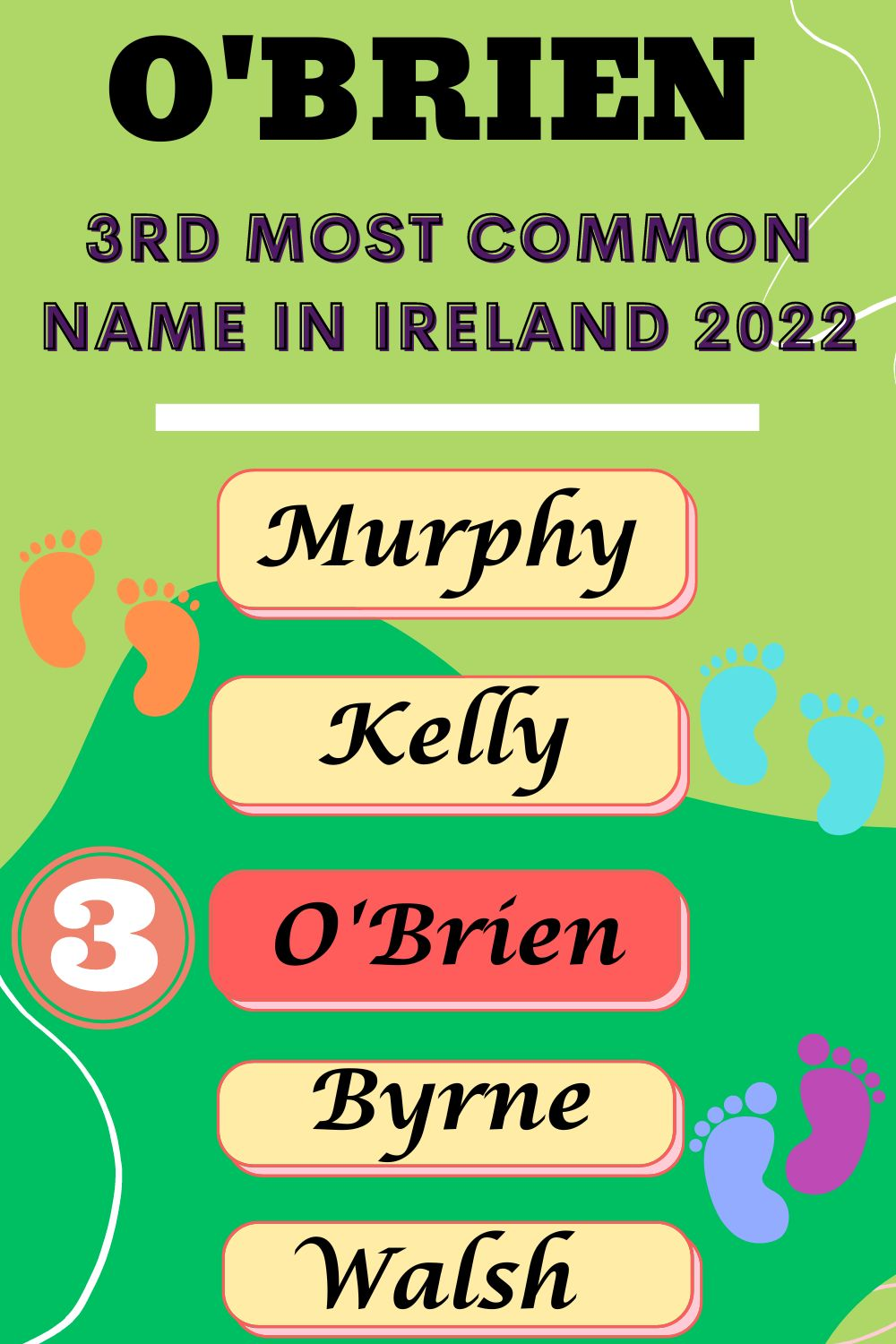
You can read about these other top names here:
Population Estimates In The 1990s
Irish genealogist Seán J. Murphy studied surname numbers in Ireland between 1992 and 1997 based on entries in telephone books.
O’Brien was the seventh most common name in this decade. This bar chart shows the names in the 6th to 10th position of top names in this survey.
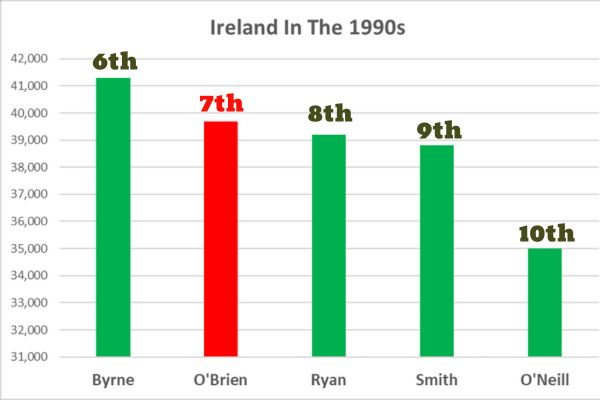
O’Brien In The Early 1900s
The 1901 and 1911 census of the island of Ireland is available from the Irish National Archives.
O’Brien was the ninth most common name in Ireland in 1901.
Ten years later, it had risen by one position to be 8th. It swapped places with O’Reilly/Reilly which fell to 9th place.
Population Estimates In The 1890s
Sir Robert Matheson published a study of Irish surnames in 1890 called “Special Report on Surnames In Ireland.”
O’Brien was the sixth highest ranking name in the survey.
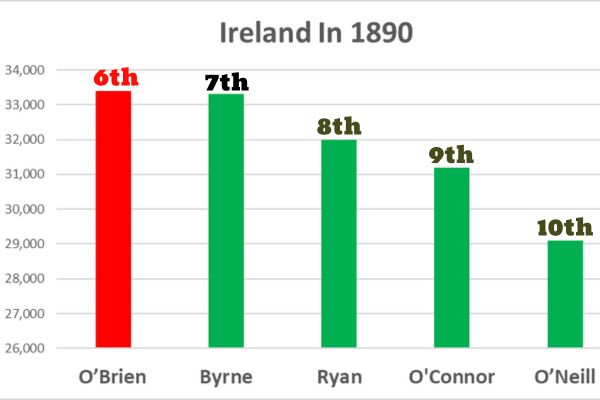
How Common Is The Name O’Brien In The United States?
The United States publishes census details up to recent decades.
For privacy reasons, the 2010 census only provides high-level totals of surnames in the entire country. But that’s exactly what we need for this article.
O’Brien In The 2010 U.S. Census
Based on the 2010 U.S. census, the name O’Brien is the eigth most common Irish name in America with 118,557 bearers.
For context, this bar chart shows the Irish names in the 6th to 10th rankings.
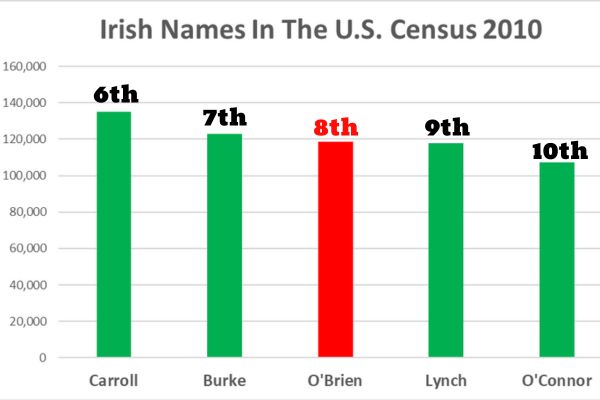
The chart doesn’t include alternate name spellings. I identified these nine alternate spelling variants of the O’Brien surname in the 2010 census:
| Variant | Census |
| O’Brien | 118,557 |
| Bryan | 57,143 |
| O’Bryan | 6,408 |
| Brian | 4,214 |
| O’Brian | 3,203 |
| Brien | 2,882 |
| McBrien | 981 |
| McBryan | 164 |
| McBrian | 160 |
O’Brien In The 1940 U.S. Census
When we go back to 1940, O’Brien was the 6th most common Irish surname in the U.S. with 74,568 bearers.
This bar chart shows the order of Irish names in the top five positions in this census.
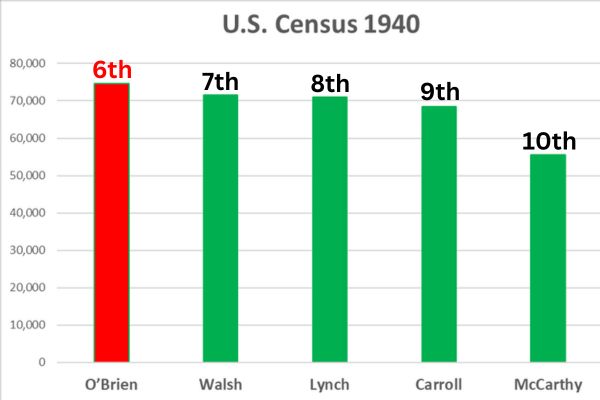
O’Brien In The 1870 U.S. Census
Let’s jump back another seventy years to the first census taken after the American Civil War.
O’Brien was the fifth most common Irish name in the 1870 census with 34,457 bearers.
O’Brien Emigration After The Irish Famine
Traditionally, Irish people have emigrated to England, Australia, New Zealand, Canada, and the United States.
The largest wave of emigration to the United States occurred during the 19th century. The peak was in response to the Great Irish Famine, which took place between 1845 and 1852.
This is illustrated when looking for the O’Brien name in the shipping passenger lists arriving into New York during this period.
Here is a line chart of passengers named O’Brien per year. As you can see, the numbers rose sharply between 1845 and 1849 and peaked in 1851.
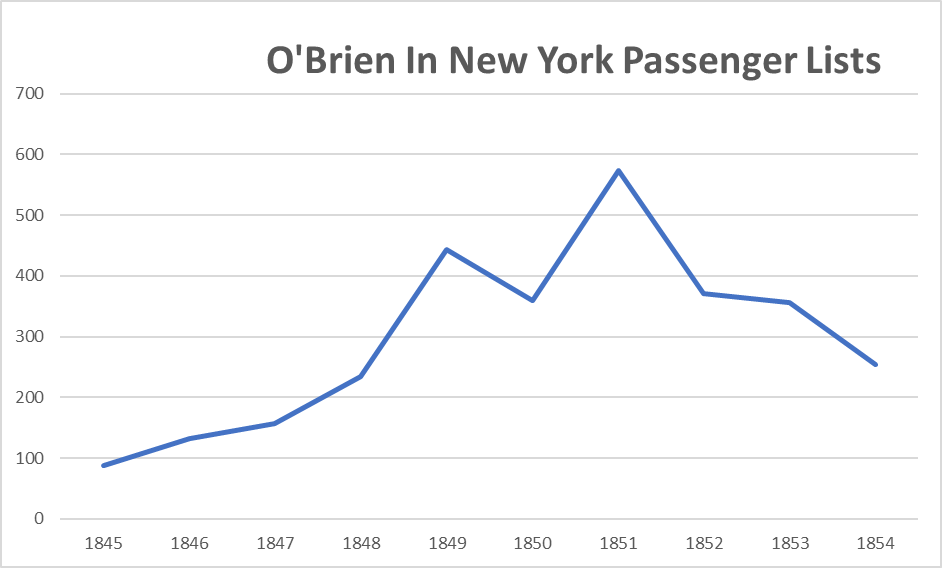
O’Brien Surname: Meaning And Origin
The Gaelic origin of O’Brien is the Irish language surname “Ó Brian”. In Irish, Ó means “descendant of”. The full name means “descendant of Brian”.
But what is the meaning of “Brian”? It’s so old that the ancient Celtic origins are uncertain. However, we do know that the person who originated the family name.
Like every child in an Irish O’Brien family, I learned from childhood of the great Brian Boru as the ancestor of the O’Brien clan. A chieftain in the Munster counties of southwestern Ireland, King Brian Boru rose in the late 10th century to become High King of Ireland.
He died after defeating the Vikings in Dublin at the Battle of Clontarf. The great importance of his legend can be seen in the national emblem of Ireland which is King Brian’s harp. You can read more about his history in our full article on Brian Boru.
Family Coat Of Arms And Motto
There are several versions of an O’Brien coat of arms. This picture is one example:
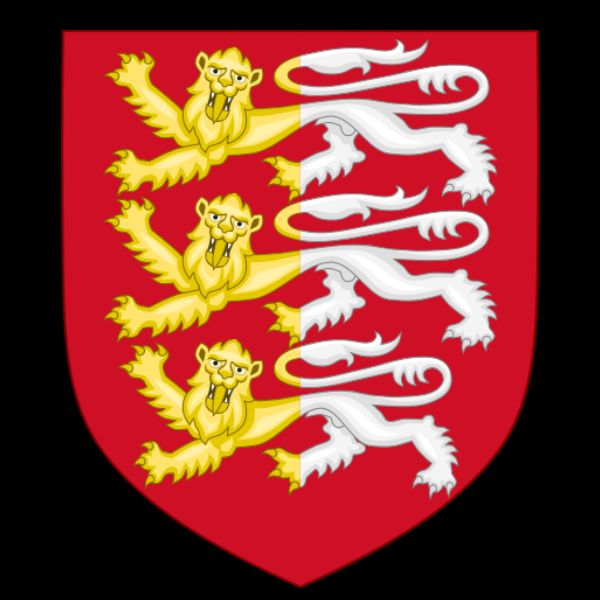
The O’Brien arms symbolise royal origins through use of the lion, a traditional regal emblem. Each of the three lions on the family crest is half golden and half silver. Gold symbolizes generosity while silver denotes peace.
In heraldry, each animal is known as a “lion passant guardant”. This refers to the walking pose with the head turned to face the viewer. The color of red of the shield denotes sacrifice.
The family motto is often found written beneath the crest. The phrase is:
Lámh Láider in Uachtar
This is Gaelic for “The Strong Hand Uppermost”.
Some versions of the crest have a single bent arm with the hand holding a sword aloft. This is the strong hand uppermost.
Historic And Famous O’Briens
There are many notable people in history with the surname O’Brien. Here are just a few:
- Murrough O’Brien (1614-1673): a powerful figure in 17th century Munster was was made Earl of Thomond (in Limerick) under Henry VIII. He earned the feared nickname “Murrough of the Burnings” for some brutal military tactics.
- Daniel O’Brien (1683-1759): third Viscount of Clare who was a founder of the Irish Brigade (the Clare’s Dragoons) within the French Army.
- Bishop John O’Brien (1701-1769): compiled an early Irish-English dictionary that was hugely influential on subsequent Irish scholarship.
- William Smith O’Brien (1803-1864): Irish politician and promoter of the Irish language who was a founder of the Young Ireland movement. William O’Brien was exiled to Australia but pardoned in 1856.
- Kate O’Brien (1897-1954): Irish novelist whose work was censored at the beginning of the Irish Free State but is now acclaimed.
- Edna O’Brien (1930- ): acclaimed Irish novelist whose first novel “Country Girls” was ground-breaking in its frank portrayal of mature themes. Despite (or because of) being banned in Ireland, it was a huge success.
- Conan O’Brien (1963- ): American comedian and talk show host.
Sources For This Article
External Research
The top ten birth numbers in Ireland for 2022 are published by the Central Statistics Office.
The Ireland 1990s estimates are from Seán J. Murphy’s research paper.
The population estimates of 1890 are based on the “Special Report on Surnames in Ireland“, originally published in 1909.
The population figures for the 2010 U.S. Census come from a file provided by the U.S. Census Bureau.
Internal Research
Some of the population numbers are based on my own research and calculations using online archives. I’ve rounded those numbers to the nearest 50 to account for transcription errors and other technical issues with online databases of this type.
The Irish census estimates for 1901 and 1911 are my calculations based on the Irish National Archives.
I plotted the emigration figures from 1845 to 1854 based on calculations from the archives of the New York Passenger Lists (1820-1957).